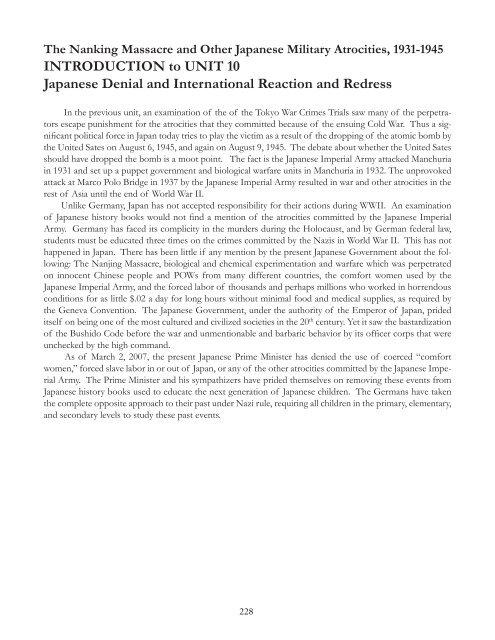Download - Canada ALPHA
Download - Canada ALPHA
Download - Canada ALPHA
You also want an ePaper? Increase the reach of your titles
YUMPU automatically turns print PDFs into web optimized ePapers that Google loves.
The Nanking Massacre and Other Japanese Military Atrocities, 1931-1945<br />
INTRODUCTION to UNIT 10<br />
Japanese Denial and International Reaction and Redress<br />
In the previous unit, an examination of the of the Tokyo War Crimes Trials saw many of the perpetrators<br />
escape punishment for the atrocities that they committed because of the ensuing Cold War. Thus a signifi<br />
cant political force in Japan today tries to play the victim as a result of the dropping of the atomic bomb by<br />
the United Sates on August 6, 1945, and again on August 9, 1945. The debate about whether the United Sates<br />
should have dropped the bomb is a moot point. The fact is the Japanese Imperial Army attacked Manchuria<br />
in 1931 and set up a puppet government and biological warfare units in Manchuria in 1932. The unprovoked<br />
attack at Marco Polo Bridge in 1937 by the Japanese Imperial Army resulted in war and other atrocities in the<br />
rest of Asia until the end of World War II.<br />
Unlike Germany, Japan has not accepted responsibility for their actions during WWII. An examination<br />
of Japanese history books would not fi nd a mention of the atrocities committed by the Japanese Imperial<br />
Army. Germany has faced its complicity in the murders during the Holocaust, and by German federal law,<br />
students must be educated three times on the crimes committed by the Nazis in World War II. This has not<br />
happened in Japan. There has been little if any mention by the present Japanese Government about the following:<br />
The Nanjing Massacre, biological and chemical experimentation and warfare which was perpetrated<br />
on innocent Chinese people and POWs from many different countries, the comfort women used by the<br />
Japanese Imperial Army, and the forced labor of thousands and perhaps millions who worked in horrendous<br />
conditions for as little $.02 a day for long hours without minimal food and medical supplies, as required by<br />
the Geneva Convention. The Japanese Government, under the authority of the Emperor of Japan, prided<br />
itself on being one of the most cultured and civilized societies in the 20 th century. Yet it saw the bastardization<br />
of the Bushido Code before the war and unmentionable and barbaric behavior by its offi cer corps that were<br />
unchecked by the high command.<br />
As of March 2, 2007, the present Japanese Prime Minister has denied the use of coerced “comfort<br />
women,” forced slave labor in or out of Japan, or any of the other atrocities committed by the Japanese Imperial<br />
Army. The Prime Minister and his sympathizers have prided themselves on removing these events from<br />
Japanese history books used to educate the next generation of Japanese children. The Germans have taken<br />
the complete opposite approach to their past under Nazi rule, requiring all children in the primary, elementary,<br />
and secondary levels to study these past events.<br />
228


